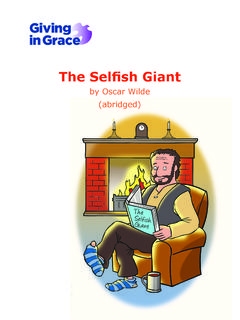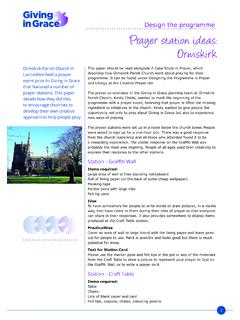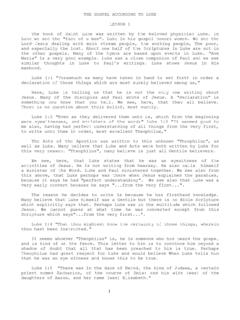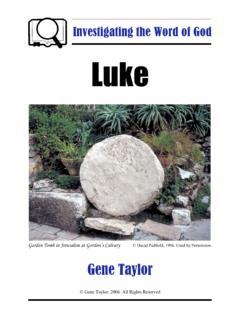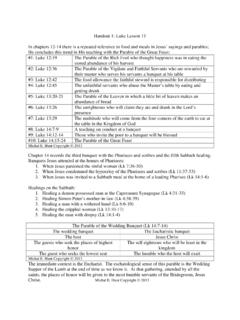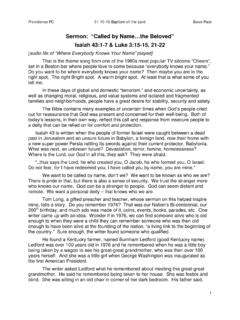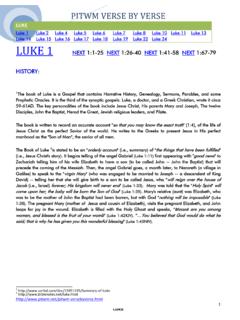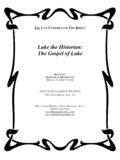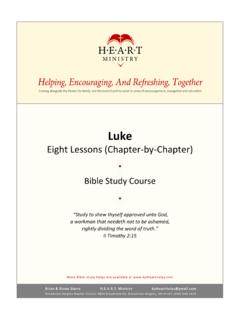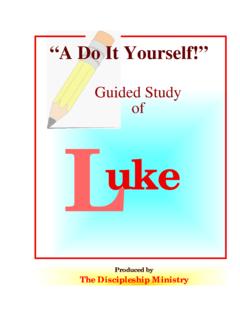Transcription of Luke Sermon notes - givingingrace.org
1 Sermon notesLukeBackground notes on four passages in luke s GospelSermon notes Giving in Grace 20132 contentsIntroduction 3 Season of Giving 5 Week one 6 The Rich rulerLuke 18:18-30 Week two 10 The Rich FoolLuke 12:13-21 Week three 14 ZacchaeusLuke 19:1-10 Week four 18 The Widow s miteLuke 21:1-4preaching notescontents3 Giving in Grace 2013 Introduction Introduction It is often said that there are over 2000 verses on wealth and possessions in the Bible. A good percentage of those verses are found in the gospel of luke for wealth is one of his key themes. By a rough count of verses something like 11% of luke touches directly on wealth and possessions. When we look at the material that is unique to luke the theme of wealth is even more sharp in Only luke tells us of the generosity of Zacchaeus, the barns of the rich fool, the tension between Dives and Lazarus at his gate and the worldly wisdom of the shrewd manager.
2 Where Matthew records, blessed are the poor in spirit luke s version not only says, blessed are the poor , he also adds woe to you rich ! luke , like Matthew, uses Mark s account of the preaching of John the Baptist as his source material. However, only luke records the advice given to those who come for baptism ( luke 3:10-14) which are explicit instructions about sharing possessions and earning income in a moral manner. Sharing possessionsAlso interesting is the treatment of wealth and possessions in the book of Acts. luke presents a picture of the early church holding possessions in common - and of those who pretended to do so. Yet a reading of later parts of the Acts story and the epistles indicates that individual Christians also retained some private property.
3 Indeed this mirrors the practice in the Essene community at Qumran where property was both shared and retained. The sharing of possessions in Acts is not simply a description of what happened but a theological statement of how things should be. Indeed the later chapters of Acts lose the emphasis on sharing and have a much greater stress on almsgiving (9:36, 10:2, 4, 31, 11:27-30, 20:35 and 24:17). PerspectivesAs luke T Johnson observes, luke consistently talks about money but he does not talk about money consistently! Unlike Mark, luke casts the command to the rich ruler to sell his possessions and give to the poor as a specific command to an individual. Yet the same command is also given to all disciples ( luke 12:33) and is reflected in those passages which portray a renunciation of personal possessions (5:11, 14:33, 18:28-29).
4 luke records Jesus teaching that the poor, not the poor in spirit are blessed ( luke 6:20) while adding also woe to you who are rich for you have already received IntroductionThe sharing of possessions in Acts is not simply a description of what happened but a theological statement of how things should be luke consistently talks about money but he does not talk about money consistently! Giving in Grace 2013preaching notesIntroduction4 Introductionyour comfort ( luke 6:24). Yet this judgement on wealth and the command to divest oneself of all possessions stands in contrast to those women of substance whose giving supported Jesus own ministry ( luke 8:1-3) and his evident use of the homes of his followers (4:38-39).
5 Levi throws a party after he had left everything to follow Jesus ( luke 5:27-30) while Zacchaeus is commended for giving away just half of his wealth ( luke 19:1-10). The command to lend money ( luke 6:34-35, Matt 5:42) assumes, of course, that we have something to lend! The point is not that luke s gospel is self-contradictory on the subject of money but that following Jesus faithfully around money is much richer than giving away our mealsA key theme in luke is the meal fellowship that characterised Jesus ministry. In the Greek/Roman world of his day meals were commonplace, serving to cement social ties and build reciprocity. Not all who attended such meals would be social equals.
6 The Younger Pliny is careful to note that despite the inequality of guests at his meals everyone is served the same quality of wine contrary to the practice of some to serve wine according to social status. Note that in luke Levi gives a great banquet for Jesus ( luke 5:27-32) while the meals in luke 7:36-50 luke 10:38-42 are unique to luke and there is no Synoptic parallel to setting the Pharisaic woes the meal-setting of luke 11:37-54 or the eating references of 13:26 and 14:15. Key parables unique to luke contain meal references: the lost sheep (15:1-6), the lost coin ( luke 15:7-10,) and the prodigal son which concludes with a feast while Zacchaeus repents in the context of a meal.
7 For luke , Jesus shared meals are sacraments of fellowship which blur the social distinctions between rich and poor and also serve to sustain the poor. ( luke 14:1-14). His point is that the gospel requires that discipleship recognises the temptations of wealth and the social divisions that inequality of wealth creates. Christians are called to meaningful and practical discipleship around their wealth and possessions. The precise shape of that discipleship is not proscribed but it is characterised by generosity which celebrates justice and not simply personal piety. i luke 1:51-53; 3:10-14; 6:24; 8:1-3; 10:1-16; 10:38-42; 11:41; 12:13-21; 14:12-14; 15:8-10; 15:11-32; 16:1-9,14; 16:19-31; 17:28-30,32; 18:9-14; 19:1-10; 21:34-36; 22:35-38 Jesus shared meals are sacraments of fellowship which blur the social distinctions between rich and poor and also serve to sustain the are called to meaningful and practical discipleship around their wealth and possessions.
8 Giving in Grace 2013 Seasons of GivingSeasons of GivingIt is possible to approach this Sermon series by viewing each passage through the lens of the four seasons. These Sermon notes do not explore this angle but it is the approach is reflected in both the bible study, Seasons of Giving, and also in the all age resources which accompany this preaching series. It offers a new perspective on these well known passages and allows them to speak afresh to : this is the season of change. Life does not stand still, nor do our dealings with money: a new job or a lost job, a baby or children leaving home, a bereavement. Each change can mean that, like the rich ruler in luke 18, we may hear a new word of God which does not deny past faithfulness but calls us to deeper discipleship and a new challenge to the place of money in our lives.
9 Winter: this is the hard season of cold, of life lying dormant and little obvious growth. So we ask, what is it that make generosity hard for us? What are the things that hold us back from giving more than we do? For the rich fool in luke 12 there was a coldness of heart, no acknowledgement either of the God who gives all we have nor the needs of those who live in the community around us, or indeed half way across the : this is the season of new life, of promise and in this season we can ask, what prompts us, moves us to generosity? For Zacchaeus in luke 19 Jesus self invitation to his home was a springtime of the heart as he responded to grace with generosity and a desire to get his financial house in orderSummer: this is the season when nature is at its richest and we ask, what does good giving look like?
10 For a poor widow in luke 21 giving in the place of worship meant a sacrificial giving which challenged even the outwardly generous giving of the wealthy and which challenges us to proportional giving but also to justice and righteousness in all our dealings with these passages from the perspective of the seasons was inspired by a beautiful modern day parable from perhaps a rather unlikely source. Oscar Wilde s short story, The Selfish Giant,explores generous living as the seasons reflect the heart of the giant who first protects and then shares his garden having encountered a small child who many years later he will meet again. This story and accompanying resources are explored under the tab The Selfish Giant in the Annual Review strand of Giving in Grace at.
